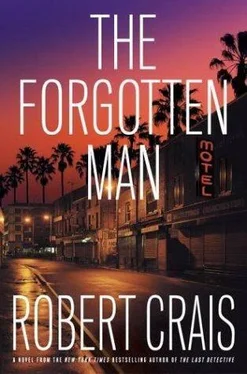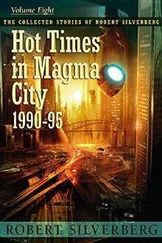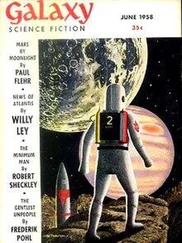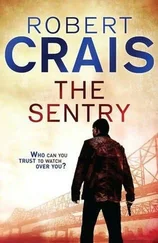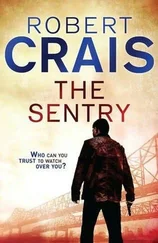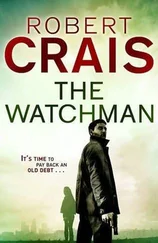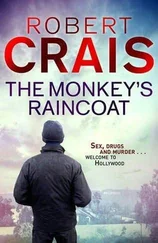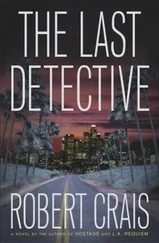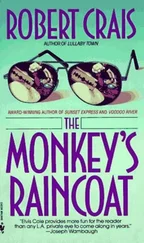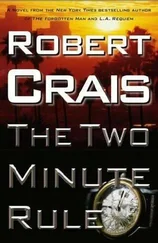"She has the boyfriend, Thomas Monte."
"That's right."
Pardy looked disappointed.
"Not bad, but not great. It's blurry."
Diaz said, "SID might be able to pull it out. We could snatch the registration with just a couple of digits."
Pardy went back to his chair.
"I'm not getting my hopes up. That backlog is a bitch. If we have to wait months to get a gun checked, how long will it be before they get around to this?"
I interrupted them.
"I can help you with that, too."
Pardy said, "What, you have your own private Walk-in Wednesday?"
So much crime was committed in Los Angeles that the LAPD lab was backlogged for months. Priorities were given to hot cases and cases going to trial, but the backlog was still so great that LAPD set up an experimental program called Walk-in Wednesday. Every Wednesday, detectives could hand-carry evidence to the lab on a first-come first-served basis to cut through the red tape. But there were still so many cases that the waiting rooms were crowded with loitering detectives.
I said, "Something like that. I have a friend at SID who owes me a favor."
"The little creep who worked with the key card?"
"Yeah, Pardy, him."
The little creep. Chen would love it.
I explained how Thomas came to take the picture, and that a couple of hundred pictures just like it were in the computer. Diaz and Pardy listened as I went through the terms of the deal, then Diaz arched her eyebrows at Pardy.
"You'd have to turn it over to Southwest Bunco, but it would still look good. I think we should go for it."
"Do whatever you want."
Diaz stared at him, and was clearly annoyed.
"Listen, Pardy, don't drop the ball here. This could turn into a major investigation with the Feds. You should get a piece of that. You should develop the case to see what you have before you hand it off. That way, you get more of the credit."
Pardy had resumed his slouch, and stared at her with sleepy eyes.
"I'm busy. You develop it if you want."
Diaz looked as if she was going to say something more, but turned back to the laptop and angled the screen for a closer look.
"Okay, fuck it. We get this cleaned up, it might be good for a registration. I want to get this over there right away."
"Are you good with the pass for Thomas and Dana?"
"We're good, but not if they had anything to do with the murder. Everything about this killing stinks like sex to me. If it turns out they had something to do with the murder, all bets are off."
Pardy said, "It wasn't about sex."
He was slouched back in the chair with his arms crossed and his legs out, looking like he was about to fall asleep. Diaz's mouth tightened with irritation.
"Okay, genius, what do you think it was?"
"A straight-up murder."
Diaz swiveled to face him, and Pardy went on.
"I haven't been sitting on my ass, Diaz. A witness ID'd Reinnike at Union Station about an hour before he was killed. Described the tats on his hands, and picked his face from a six-pack."
"What witness?"
"Homeless dude I know from Metro. Reinnike was hanging around, he said. My guy hit him up for a handout, and Reinnike came across. I'm thinking if Reinnike was at Union Station, he was meeting someone."
Maybe Pardy looked sleepy because he had been working the case all night.
Diaz said, "Then what? Someone picked him up, and they drove to an alley in the middle of nowhere? Why the alley? Why that alley?"
Pardy stared at her, and seemed absolutely confident in his answer.
"Because it was in the middle of nowhere. Because whoever brought him there intended to kill him. They might have even murdered him somewhere else, and the alley is just a body dump. We didn't find a shell casing. We didn't find the cell phone Cole said he had. A lot of things are missing."
Diaz frowned, but I was liking how Pardy was putting it together.
She said, "Beckett found no evidence the body was moved."
"If he wasn't moved far and he was moved right away, there wouldn't necessarily be anything to find."
I said, "How about the car? Did your guy see the car?"
"No, but it had to be nearby or someone gave Reinnike a ride. That alley is a long walk from the station. I walked it myself. Reinnike couldn't have made the walk in an hour."
Diaz studied Pardy as if she had never seen him before. A deep smile slowly split her face, but Pardy didn't smile back. Diaz fingered the little heart necklace.
"Well, now, that is outstanding police work, Detective. That is truly excellent work."
Pardy nodded, and Diaz went on.
"Have your wit bring you around to his friends. Talk to them, too."
"Already in the works."
Diaz smiled at him a little bit longer, but Pardy didn't return her smile.
"Okay, Cole, you're going to talk to your boy, Chen?"
"I'll bring it over now."
Pardy roused himself from the chair and picked up Stephen's computer.
"I'll bring it. I want to meet your pal, Chen. Maybe I can get my own private Walk-in Wednesday."
Diaz said, "Give Cole an evidence receipt."
"Sure. I can do that."
Pardy filled out a receipt for the computer, signed it, and then they told me to leave.
Frederick
Frederick did not open Payne's gas station that morning.
He had spent most of the night sick to his stomach with the growing certainty that he would not be able to escape.
The army of forces aligned against him was enormous, and might be anyone-Cole, a policeman, the priest, any random motorist who pulled to the pumps; everyone who crossed his path might be a tentacle employed by the beast that was trying to find him. Frederick imagined a dozen scenarios, all of them ending with his own terrible death, until finally he locked his trailer, brought the shotgun out to his truck, and drove back to Los Angeles to see if the police were still guarding Cole's house.
John Chen was out of the office that morning working a homicide near Chavez Ravine. I left word on his voice mail explaining about Golden's computer, and asked him to call. After I left word for Chen, I called Starkey.
"Detectives. This is Starkey."
"It's me."
"Oh. Hey."
She sounded uncomfortable. I was uncomfortable, too.
"I feel bad about last night. I didn't mean it to play that way."
"What are you talking about? I didn't think twice."
"I could've played it better, is all. I should've asked you to stay. Lucy was all for it."
"Cole, please, you're making too much out of this. You had to adjust your plans. I'm cool with that."
"Okay. Listen, I want to talk to you about David Reinnike. Can you meet me at Musso's? We could have a late breakfast."
"Look, Cole, what is this, a mercy meal? You don't have to feed me today to make up for last night. It's not like I don't have a life."
"I'm not trying to make it up. I still need a way to find Reinnike, and I want your opinion."
She hesitated.
"C'mon, Starkey. Please."
"Begging is good, Cole. Begging, I like. I'll meet you in twenty minutes."
She hung up before I could say something smart.
Musso Frank Grill on Hollywood Boulevard was a five-minute walk from the Hollywood station. It's been in the same location since 1938, hunkered down behind glass-paned doors that have kept the restaurant safe since Hollywood 's early beginnings when movie stars and studio heads filled the back tables. They've served pretty much the same menu since 1938, too. When other restaurants in L.A. went light with nouvelle cuisine, Musso's piled on butter and salt. Hollywood declined in the sixties when street people, prostitutes, and crime sprouted on the boulevard. The city decayed into a crime-ridden slum, but Musso's survived all that, and flourished. Maybe because of its history, or maybe because of the tough old men who served as the waiters and simply refused to let such a good thing die. It was and always has been one of my favorite restaurants. I liked it that they refused to change. The world caught up to them again. It was a good place to eat.
Читать дальше
